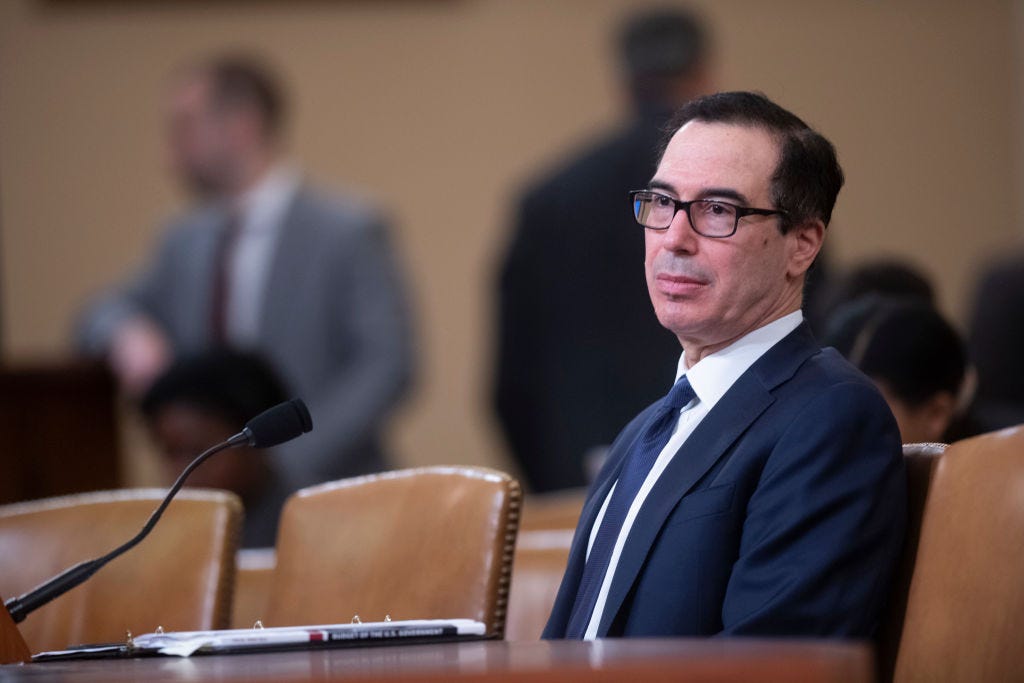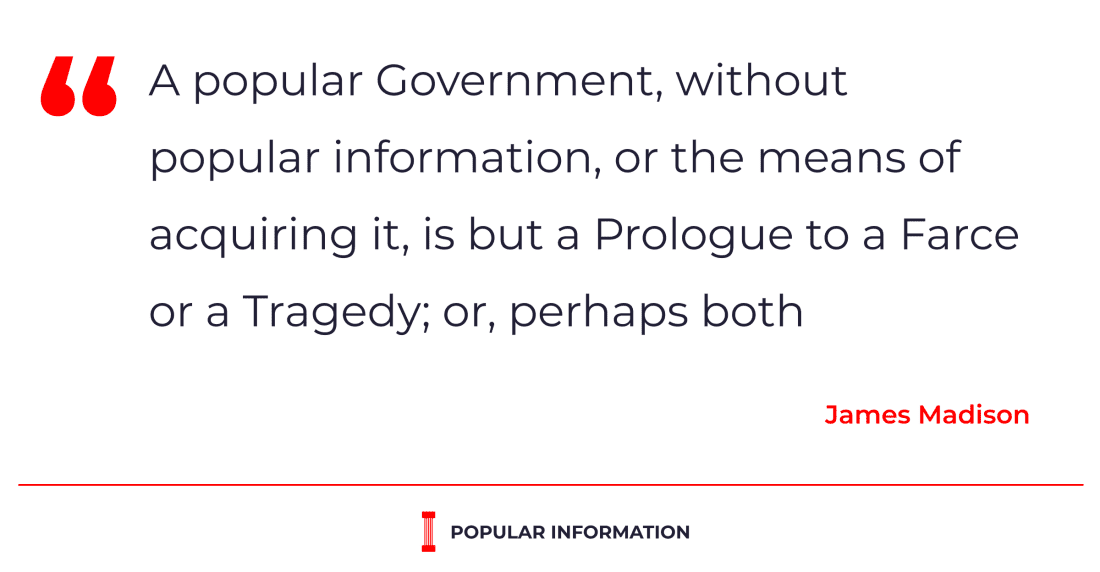Seven weeks later

U.S. Treasury Secretary Steven Mnuchin (Photo by Mark Makela/Getty Images)
On March 28, the CARES Act — emergency legislation to blunt the impact of the pandemic — was signed into law. The package provided the Treasury Department with a $500 billion fund to stabilize the economy. The money would be routed through the Federal Reserve to support trillions in lending to corporations and state and local governments. Seven weeks later, very little of the money has been spent.
(This fund is separate from the $660 billion Paycheck Protection Program, aimed at small businesses, that has been the focus of Popular Information's reporting to date.)
The status of the program was revealed Monday in the first report of the Congressional Oversight Commission (COC), a body created by the CARES Act to conduct oversight of Treasury spending under the program. The report provides a chilling summary of the economic devastation brought on by the pandemic:
More than one quarter of the U.S. economy has been idled—a fall in output equivalent to what occurred between 1929 and 1933 during the Great Depression. Many industries have been particularly hard-hit. For example, retail sales in March fell by $46.2 billion, an amount almost equal to the entire decline over the full 16 months of the Great Recession, and in April they fell by $79.6 billion.
...Over the eight weeks ending on May 9, 36.5 million Americans filed unemployment claims. When this number is combined with the 7.1 million Americans already unemployed as of March 13, the total equals more than 40 million. Between people who are unemployed and underemployed, some experts estimate that the real unemployment rate is actually 22.8% or as high as 25%
...A Federal Reserve (the “Fed”) survey found that “[a]mong people who were working in February, almost 40 percent of those in households making less than $40,000 a year had lost a job in March.”15
Congress, when it set up the COC, anticipated that the program would be further along by now. The legislation requires the COC to report, every 30 days, on the "impact of loans, loan guarantees, and investments...on the financial well-being of the people of the United States and the United States economy, financial markets, and financial institutions."
But the first report contains very little of that information since so little of the money has been spent. Out of $500 billion, the Treasury Department has dispersed just $37.5 billion to the Federal Reserve. On May 12, the Federal Reserve began using that money to purchase certain corporate bonds and other financial instruments. Neither the Treasury Department nor the Federal Reserve has disclosed when additional funds would be available.
The slow pace of the efforts by the Treasury Department and the Federal Reserve is at odds with the rapid destruction of economic security for millions of Americans.
Main Street waits
About $75 billion of the $500 billion Treasury fund will be spent on the Main Street Lending Program, which is a suite of programs "intended to facilitate lending by banks to small and medium-sized businesses."
Originally, the program was set up to benefit "businesses with up to 10,000 employees or up to $2.5 billion in 2019 annual revenues." Last month, however, the Federal Reserve "[e]xpanded the businesses eligible to receive loans under these facilities to businesses with up to 15,000 employees or up to $5 billion in 2019 annual revenues." Companies that fit this category "collectively employed between 30 million and 40 million Americans."
The Federal Reserve "eliminated the requirement that companies attest that they require financing 'due to the exigent circumstances presented' by COVID-19." It will also not require companies that receive these loans to "maintain payroll and retain employees." Instead, companies will certify that they are making “commercially reasonable efforts” to do so.
Banks can "can lend up to $25 million in new loans or refinance up to $200 million in an existing loan if a firm’s total debt, relative to its 2019 earnings, is below certain thresholds." Federal Reserve officials say "they are working to fine-tune the program."
While none of the money has been made available, the Federal Reserve's announcement that it intends to backstop such businesses has had some salutary impacts. The announcement made banks more willing to lend during the pandemic, and some businesses have subsequently been able to secure private loans. But seven weeks after the CARES Act became law, others are still having a hard time securing capital.
Technical changes benefit the oil and gas industry
Another change the Federal Reserve made to the Main Street Lending Program was to allow "make it easier for already indebted companies to access government-backed loans." The change could "benefit several heavily indebted small- to medium-size oil and gas companies" and mirrors "lobbying requests from oil and gas companies."
Bharat Ramamurti, a member of the COC and a former aide to Elizabeth Warren (D-MA), questioned "how the changes promote the broader public interest."
The Federal Reserve and the Treasury Department denied the change was targeted at the oil and gas industry. But Senator Dan Sullivan (R-AK) admitted the move was “clearly a reflection on what we’ve been advocating for” to help oil and gas companies.
Stocks up, sense of urgency down
The real success of the Treasury Department and the Federal Reserve, to this point, is boosting the stock market, As the COC notes, "Between April 8, the day before the announcement, and April 29, the S&P 500 Index rose 6.9% and the Dow Jones Industrial Average rose 5.1%." The Federal Reserve seems particularly focused on propping up the markets, having taken a number of actions to reassure investors outside the scope of the CARES Act.
The stock market, however, does not reflect the economic conditions of average Americans.
No captain at the COC
The COC has its own issues. While four members have been named, the chair must be jointly appointed by House Speaker Nancy Pelosi (D-CA) and Senate Majority Leader Mitch McConnell (R-KY). They haven't been able to agree on someone, which has left the COC without a leader.
The next report will be released in mid-June.
Thanks for reading!



Americans need to vote in November to give majority control of the Senate to the Democrats, keep the majority in the House, & elect a Democratic President. Democrats are not by any means perfect, but would be a vast improvement over what is in office now. Our Country will not survive if the Republicans remain in office.
*sees Steve Mnuchin in the picture upon first accessing article*
This is bad news about the CARES Act, isn't it?